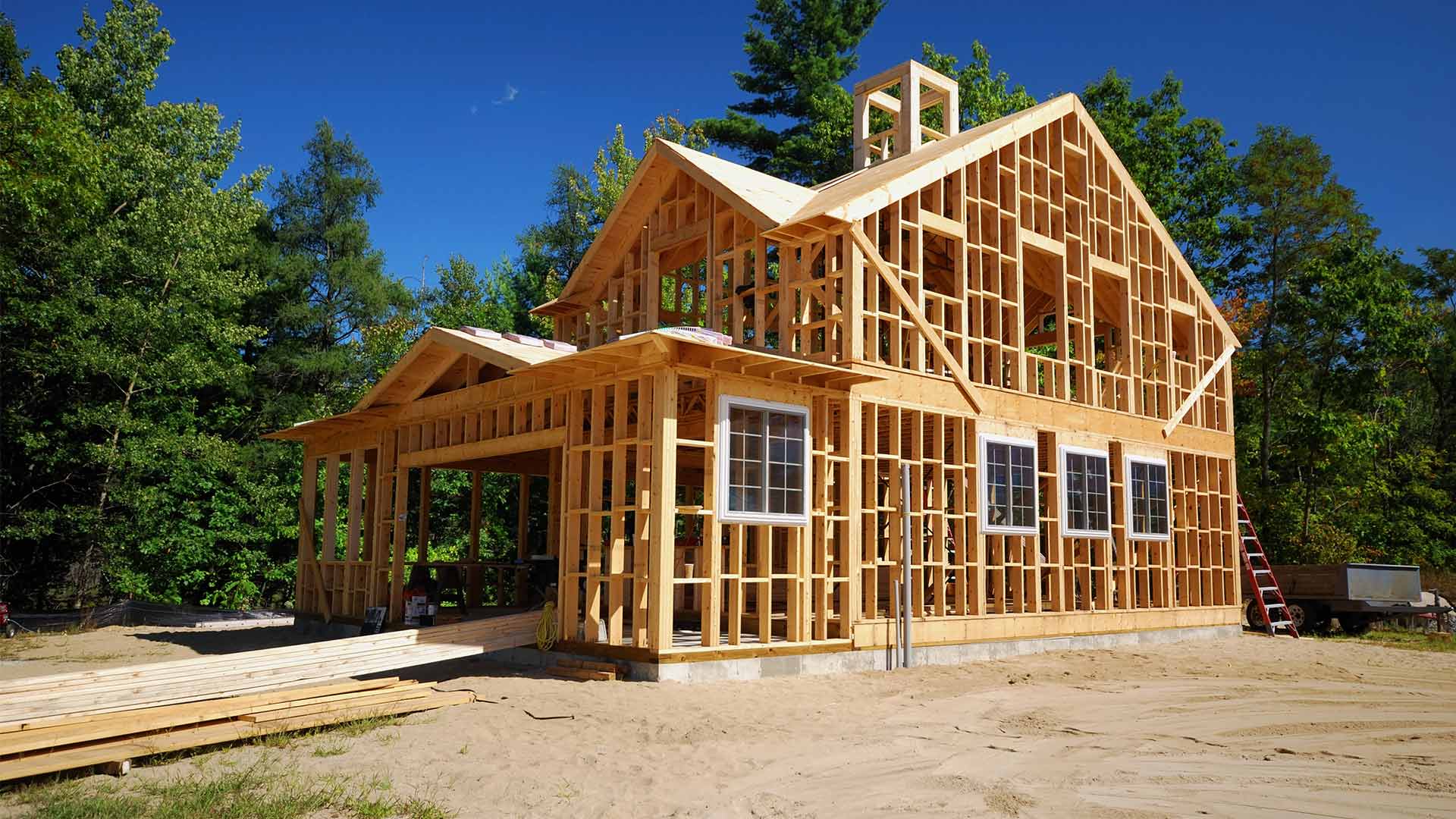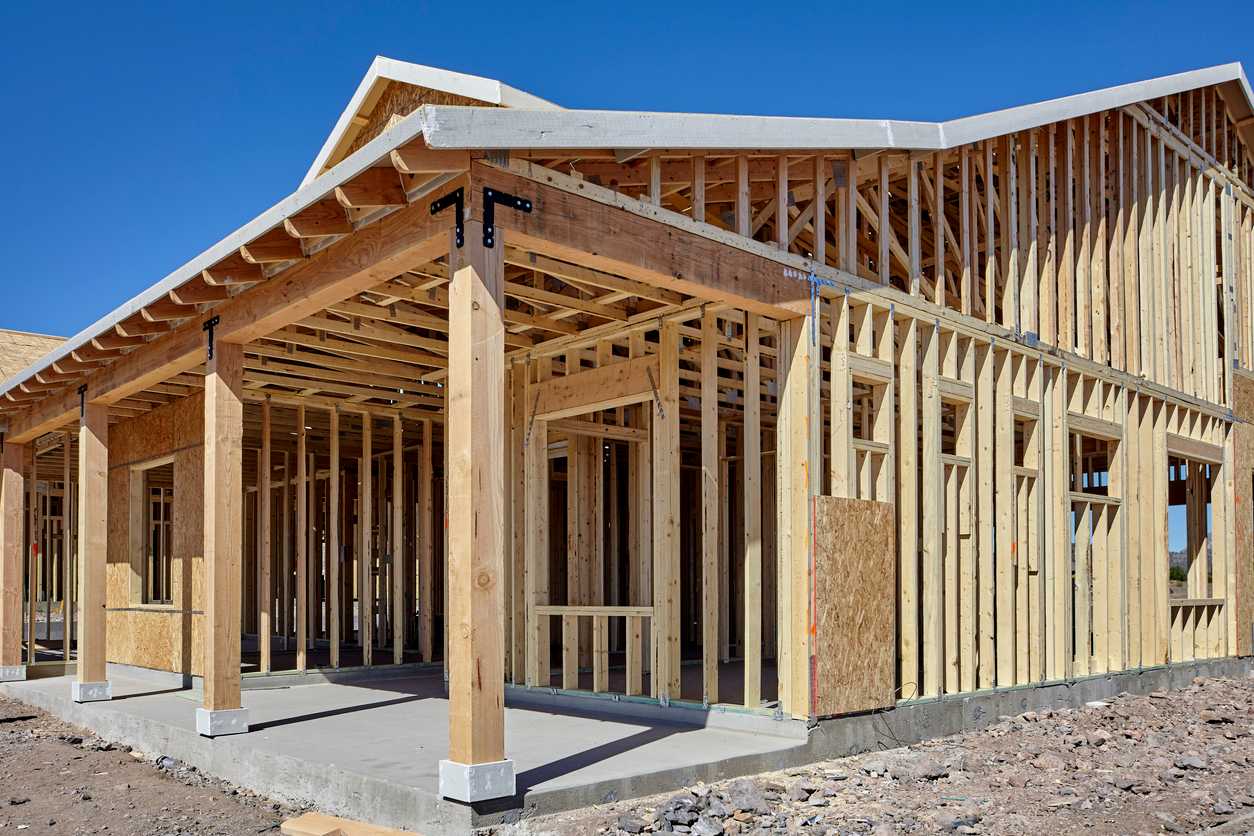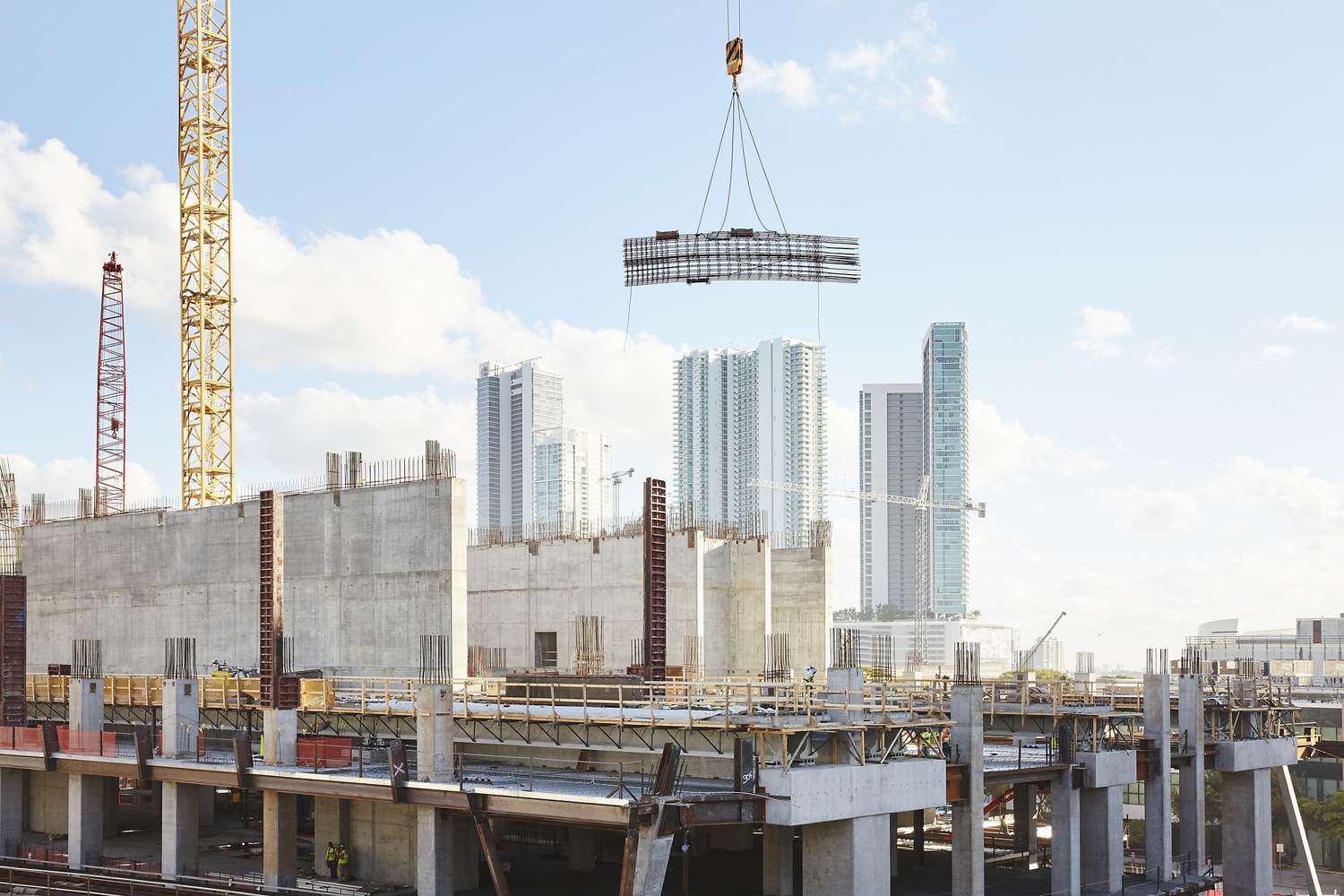Home>diy>Building & Construction>What Credit Score Is Needed For A New Construction Loan


Building & Construction
What Credit Score Is Needed For A New Construction Loan
Modified: December 7, 2023
Discover the credit score required for a new construction loan. Find out how your building construction project can be financed with the right credit score.
(Many of the links in this article redirect to a specific reviewed product. Your purchase of these products through affiliate links helps to generate commission for Storables.com, at no extra cost. Learn more)
Introduction
Building your dream home from the ground up can be an exciting and rewarding experience. However, it also requires careful planning and a solid financial foundation. When it comes to financing a new construction project, one of the crucial factors that lenders consider is your credit score.
A credit score is a numerical representation of your creditworthiness, indicating how likely you are to repay your debts. It is a primary tool that lenders use to assess the risk associated with lending you money. This score is based on various factors, such as your payment history, credit utilization, length of credit history, and the types of credit you have.
In the case of a new construction loan, which is a specific type of loan designed for financing the construction of a new home, your credit score plays a key role in the approval process. Lenders use your credit score to evaluate your ability to manage debt and determine the level of risk they are taking by lending you the funds needed to complete your project.
Understanding the importance of your credit score in obtaining a new construction loan can help you take the necessary steps to improve your creditworthiness and increase your chances of approval.
Key Takeaways:
- Your credit score significantly impacts your eligibility for a new construction loan. A higher score can lead to better loan terms, while a lower score may result in higher interest rates or even denial of the loan application.
- Factors such as income, employment history, debt-to-income ratio, and the builder’s reputation also influence new construction loan approval. Researching lenders and improving your creditworthiness can increase your chances of securing favorable loan terms.
Understanding New Construction Loans
New construction loans are specifically designed to finance the construction of a new home or building. Unlike traditional mortgage loans that are used to purchase an already-built property, new construction loans provide funding for the construction process and are typically short-term loans that convert into a permanent mortgage once the construction is complete.
These loans are different from standard home loans, as they take into account the unique aspects of building a new property. The funds from a new construction loan are typically disbursed in stages, known as “draws,” to cover the costs associated with each phase of the construction process.
One of the key differences with new construction loans is that lenders consider the estimated value of the property once it is built, known as the “as-completed” value, rather than the current value of the land or any existing structures. This allows lenders to determine the loan amount based on the projected value of the completed home.
New construction loans are often used by individuals who want to build a custom home tailored to their specific needs and preferences. They may also be used by developers and builders to construct multiple properties or to renovate existing structures.
It’s important to note that new construction loans typically have higher interest rates and stricter eligibility criteria compared to traditional mortgage loans. This is due to the higher risk associated with the construction process and the fact that the property has not yet been built.
By understanding the ins and outs of new construction loans, you can make informed decisions and navigate the loan application process more effectively.
Importance of Credit Score in New Construction Loan Approval
When applying for a new construction loan, your credit score plays a crucial role in the approval process. Lenders use your credit score to assess your creditworthiness and determine your eligibility for the loan. Here are some key reasons why your credit score is important for getting approved for a new construction loan:
- Risk Assessment: Your credit score is an indicator of how likely you are to repay your debts. Lenders use it to evaluate the risk associated with lending you money. A higher credit score suggests that you have a history of responsible financial behavior and are more likely to make timely loan payments.
- Loan Terms and Interest Rates: A good credit score can help you secure more favorable loan terms, such as lower interest rates and fees. Lenders are more willing to offer competitive rates to borrowers with higher credit scores, as they are considered less risky. On the other hand, a lower credit score may result in higher interest rates or even denial of the loan application.
- Loan Amount: Your credit score can also influence the maximum loan amount you qualify for. Lenders may have stricter guidelines and lower loan-to-value ratios for borrowers with lower credit scores. A higher credit score may, therefore, increase the amount of financing available to you.
- Builder and Lender Relations: In some cases, the reputation of the builder and lender may play a role in the loan approval process. Lenders may be more willing to work with reputable builders and developers, knowing that the construction process is likely to be completed successfully. A good credit score demonstrates your financial responsibility, which can positively impact the perception of both the lender and builder.
It’s important to note that while your credit score is a significant factor in the loan approval process, lenders also consider other factors such as your income, employment history, debt-to-income ratio, and the appraised value of the property.
Understanding the importance of your credit score in obtaining a new construction loan can motivate you to take proactive steps to improve and maintain a good credit history. By doing so, you can increase your chances of loan approval and secure more favorable loan terms for your construction project.
Minimum Credit Score Requirements for New Construction Loans
The minimum credit score requirement for a new construction loan can vary depending on the lender and the specific loan program. While there is no universal credit score cutoff for new construction loans, having a higher credit score generally increases your chances of approval and may qualify you for better loan terms. However, it’s important to note that each lender sets its own credit score requirements, so it’s essential to research and compare lenders to find the best fit for your financial situation.
As a general guideline, most lenders prefer borrowers to have a credit score of at least 620 or higher to be eligible for a new construction loan. However, some lenders may be more flexible and consider applicants with lower credit scores, depending on other factors such as income stability, down payment amount, and debt-to-income ratio.
In addition to the credit score requirement, lenders also evaluate your credit history to determine your creditworthiness. They review your payment history, outstanding debts, and the length of your credit history. It’s important to have a clean payment record with no recent late payments or delinquencies, as this can negatively impact your loan approval chances.
While a credit score of 620 or higher is often the minimum requirement, having a higher credit score can provide added advantages. Lenders may offer more competitive interest rates, lower down payment requirements, and greater loan amounts with a higher credit score.
It’s important to note that even if your credit score meets the minimum requirement, it does not guarantee loan approval. Lenders consider various factors in their decision-making process, including your income, employment history, debt-to-income ratio, and the appraised value of the property.
If you have a credit score below the minimum requirement, it doesn’t mean you can’t secure a new construction loan. You can take steps to improve your credit score over time, such as paying off outstanding debts, making timely payments, and reducing your credit utilization ratio. Additionally, working with a reputable builder and having a substantial down payment can also strengthen your loan application.
Overall, while there is no specific credit score threshold for new construction loans, having a higher credit score improves your chances of approval and can lead to more favorable loan terms. It’s important to consult with different lenders to understand their specific credit score requirements and to work on improving your creditworthiness before applying for a new construction loan.
A credit score of 680 or higher is typically needed for a new construction loan. It’s important to maintain a good credit history and keep your credit utilization low to improve your chances of approval.
Factors Influencing Credit Score Requirements for New Construction Loans
When it comes to new construction loans, several factors influence the credit score requirements set by lenders. These factors help lenders assess the risk associated with financing a new construction project and determine the creditworthiness of the borrower. Here are some key factors that influence credit score requirements for new construction loans:
- Lender’s Risk Appetite: Each lender has its own risk tolerance and lending criteria. Some lenders may be more conservative and require higher credit scores, while others may be more flexible and consider borrowers with lower scores. It’s important to research and compare lenders to find one that aligns with your credit profile and financial situation.
- Loan Program: Different loan programs have varying credit score requirements. For example, government-backed loans such as FHA and VA loans often have more lenient credit score requirements compared to conventional loans. Understanding the specific credit score requirements for the loan program you are interested in can help guide your loan search.
- Loan Amount and Loan-to-Value Ratio: The loan amount and the loan-to-value ratio (LTV) can also influence credit score requirements. Some lenders may have lower credit score requirements for smaller loan amounts or lower LTV ratios. As the loan amount or LTV ratio increases, lenders may impose stricter credit score requirements to mitigate their risk.
- Compensating Factors: In some cases, lenders may consider compensating factors that offset lower credit scores. These factors may include a high income, a substantial down payment, a stable employment history, or a low debt-to-income ratio. Lenders may be more willing to approve a new construction loan if these compensating factors outweigh the lower credit score.
- Market Conditions: Credit score requirements can also be influenced by current market conditions and economic factors. During periods of economic uncertainty or when the housing market is facing challenges, lenders may tighten their credit score requirements to minimize risk.
It’s important to remember that credit score requirements for new construction loans are not set in stone and can vary among lenders. It’s advisable to consult with multiple lenders and understand their specific credit score requirements and factors taken into consideration. Keeping a close eye on your credit score, managing your debts responsibly, and working on improving your creditworthiness can increase your chances of meeting the lender’s requirements and securing a new construction loan.
How to Improve Your Credit Score for a New Construction Loan
If your credit score is not where you want it to be for a new construction loan, don’t worry. There are steps you can take to improve your creditworthiness and increase your chances of loan approval. Here are some tips to help you improve your credit score:
- Pay Your Bills on Time: One of the most important factors influencing your credit score is your payment history. Make sure to pay all your bills, including credit card bills, loans, and utilities, on time. Late payments can have a negative impact on your credit score.
- Reduce Credit Card Balances: High credit card balances can negatively affect your credit score. Aim to keep your credit utilization ratio below 30%. Paying down your credit card balances can help improve your credit score.
- Avoid Opening New Credit Accounts: Opening multiple new credit accounts within a short period can negatively impact your credit score. It is best to avoid taking on new credit unless absolutely necessary.
- Monitor Your Credit Report: Regularly check your credit report to identify errors or inaccuracies that may be bringing your score down. If you find any discrepancies, dispute them with the credit reporting agencies to have them corrected.
- Keep Old Credit Accounts Open: Length of credit history is an important factor in calculating your credit score. Even if you no longer use an old credit card, keeping the account open can help maintain a longer credit history and improve your score.
- Limit Credit Inquiries: Each time you apply for new credit, it can result in a hard inquiry on your credit report, which can lower your score. Limit the number of credit inquiries by only applying for credit when necessary.
- Work on Debt Reduction: Paying down your existing debts can help boost your credit score. Focus on reducing high-interest debts and avoid taking on new debts that may increase your debt-to-income ratio.
- Establish a Stable Employment History: Lenders often consider stable employment as a positive factor in loan approval. Maintaining a steady job and income can improve your creditworthiness in the eyes of lenders.
- Consult with a Professional: If you’re finding it challenging to improve your credit score on your own, consider reaching out to a credit counseling agency or a financial advisor. They can provide guidance and assistance to help you improve your creditworthiness.
Remember, improving your credit score takes time and patience. It’s important to be consistent with your efforts and practice responsible financial habits. By taking these steps to enhance your creditworthiness, you can increase your chances of securing a new construction loan with favorable terms.
Other Factors Considered in New Construction Loan Approval Process
While your credit score is an important consideration in the new construction loan approval process, lenders take into account several other factors before making a decision. These additional factors help lenders assess your financial stability and the viability of the construction project. Here are some key factors that lenders consider when approving a new construction loan:
- Income and Employment History: Lenders evaluate your income and employment history to ensure that you have a stable source of income to repay the loan. A consistent employment history and steady income can enhance your loan application and increase your chances of approval.
- Debt-to-Income Ratio (DTI): Your DTI ratio is a measure of your monthly debt obligations relative to your income. Lenders assess your DTI ratio to determine how much of your income is already allocated towards debt payments. A lower DTI ratio indicates a lower risk and can improve your loan approval chances.
- Down Payment: The amount of money you are able to put towards a down payment can influence the lender’s decision. A larger down payment demonstrates your financial commitment and reduces the loan amount, making it less risky for the lender.
- Appraised Value of the Property: Lenders require a professional appraisal of the property to determine its current and future value. The appraised value helps determine the loan-to-value ratio (LTV), which is the loan amount compared to the value of the property. A lower LTV ratio may increase your chances of loan approval.
- Builder’s Reputation and Experience: Some lenders may consider the reputation and experience of the builder or contractor involved in the project. A reputable and experienced builder can instill confidence in the lender that the construction process will be completed successfully.
- Loan Documentation: Lenders require various documents to assess your financial standing and the details of the construction project. This includes building plans, contractor bids, construction timelines, and cost estimates. Providing accurate and complete loan documentation is crucial for a smooth approval process.
- Reserve Funds: Lenders may require borrowers to have reserve funds available to cover unexpected costs and to demonstrate financial stability. Having sufficient reserve funds can bolster your loan application and alleviate concerns about your ability to handle financial hardships during the construction process.
- Loan Program and Lender Requirements: Different loan programs and lenders may have specific eligibility criteria and requirements. It’s important to research and understand the specific guidelines and requirements of the loan program and lender you are considering.
It’s worth noting that while these factors are important considerations, the weight given to each factor may vary among lenders. Some lenders may place more emphasis on certain factors while considering others to a lesser extent. Consulting with different lenders and understanding their specific requirements can help you tailor your loan application accordingly.
Ultimately, by preparing a strong loan application, providing documentation that supports your financial stability and the viability of the construction project, and working with reputable professionals, you can increase your chances of obtaining approval for a new construction loan.
Conclusion
Securing a new construction loan for your dream home is an exciting endeavor that requires careful planning and preparation. While your credit score is a significant factor in the loan approval process, there are various other factors that lenders consider. Understanding these factors and taking proactive steps to improve your creditworthiness can increase your chances of approval and help you secure more favorable loan terms.
It’s important to research and compare lenders to find one that aligns with your credit profile and financial goals. Different lenders may have varying credit score requirements and additional criteria that they consider in the loan approval process. By consulting with multiple lenders, you can find the best fit for your specific situation.
In addition to your credit score, lenders evaluate your income, employment history, debt-to-income ratio, down payment amount, appraised value of the property, and the reputation and experience of the builder. These factors collectively provide a comprehensive assessment of your financial stability and the viability of the construction project.
Improving your credit score for a new construction loan involves responsible financial habits such as paying your bills on time, reducing credit card balances, and avoiding opening new credit accounts. Regularly monitoring your credit report, keeping old credit accounts open, and seeking professional help when needed can also contribute to a stronger credit profile.
Remember that each lender has its own lending criteria, so it’s important to research and understand their specific requirements. By preparing a thorough and well-documented loan application and working with reputable professionals, you can increase your chances of obtaining approval for a new construction loan.
Building your dream home is a significant milestone, and with the right financial foundation, you can turn your vision into a reality. By understanding the importance of your credit score and the factors that lenders consider, you can navigate the new construction loan approval process with confidence and embark on the exciting journey of building your dream home.
Frequently Asked Questions about What Credit Score Is Needed For A New Construction Loan
Was this page helpful?
At Storables.com, we guarantee accurate and reliable information. Our content, validated by Expert Board Contributors, is crafted following stringent Editorial Policies. We're committed to providing you with well-researched, expert-backed insights for all your informational needs.















0 thoughts on “What Credit Score Is Needed For A New Construction Loan”